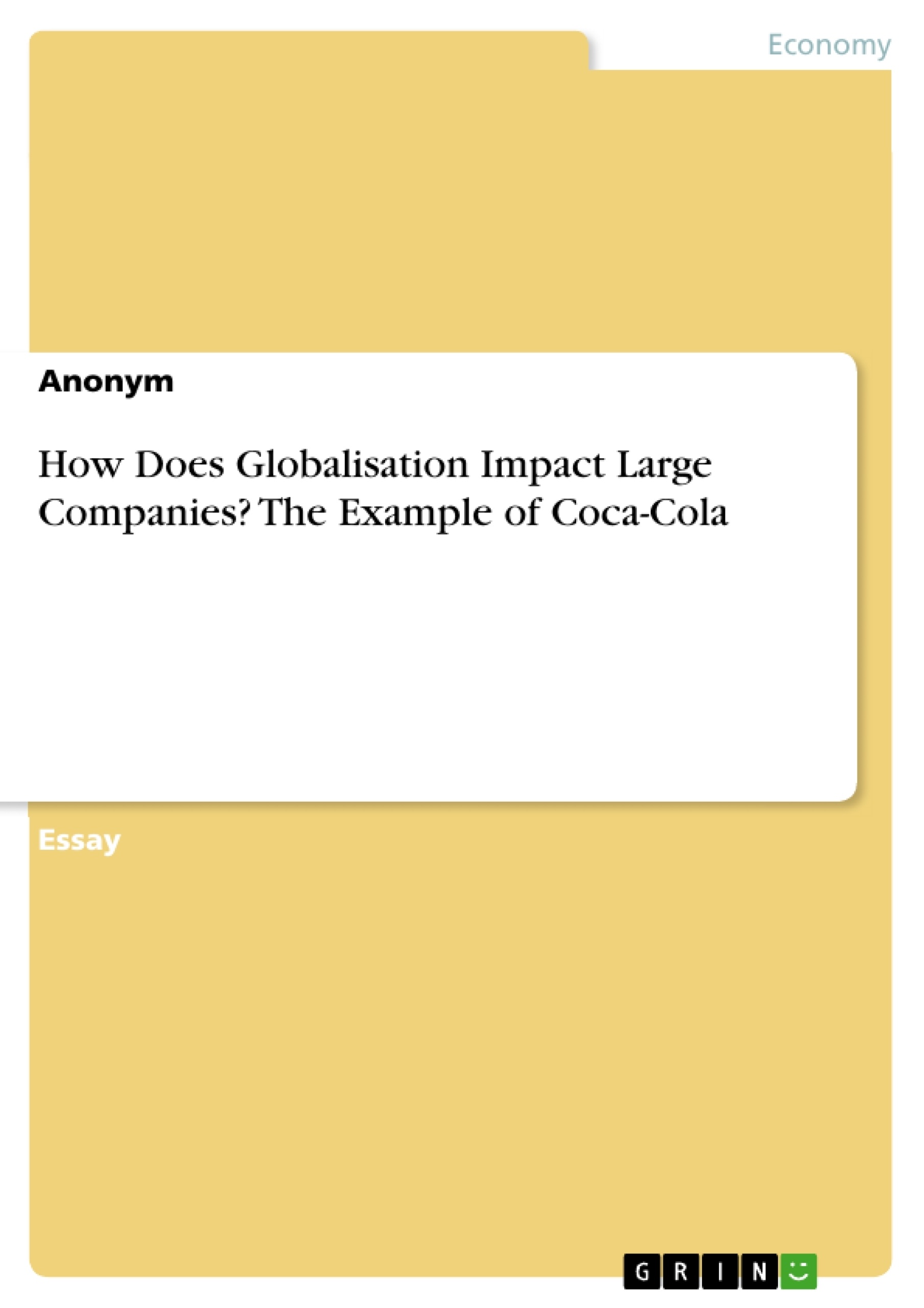This essay examines the question, how large companies are affected by globalisation. Special focus herein lies on the question how Coca-Cola is coping with its requirements and challenges.
In a first step, the concept of globalisation is defined and light is shed on its origin before, secondly, the way how Coca-Cola as a company has dealt, and is still dealing, with its ramifications is discussed.
Table of Contents
- Introduction
- The Impact of Globalization on Coca-Cola Stakeholders
- Customers
- Employees
- Community
Objectives and Key Themes
This paper aims to examine the impact of globalization on various stakeholder groups within the Coca-Cola Company. It explores both the positive and negative consequences of globalization on Coca-Cola's operations and its relationships with its customers, employees, and the communities where it operates.
- Globalization's influence on Coca-Cola's global expansion
- The impact of globalization on customer experiences and satisfaction
- The effects of globalization on employee opportunities and challenges
- Globalization's impact on community relations and social responsibility
- The trade-offs between economic benefits and potential negative consequences of globalization
Chapter Summaries
Introduction: This introductory chapter defines globalization as the increased interaction and integration across political, social, and economic spheres, facilitated by advancements in transportation and technology. It highlights Coca-Cola's global expansion as a prime example and sets the stage for analyzing globalization's effects on the company's stakeholders.
The Impact of Globalization on Coca-Cola Stakeholders: This chapter lays the groundwork for the subsequent analysis by defining stakeholders as individuals or groups affected by Coca-Cola's actions. It identifies key stakeholder groups—customers, employees, and the community—and previews the multifaceted impact of globalization on each. The chapter establishes the framework for understanding how globalization simultaneously presents opportunities and challenges for Coca-Cola and its various stakeholders.
Customers: This section explores the dual impact of globalization on Coca-Cola's customers. On the one hand, increased accessibility of Coca-Cola products due to global expansion and efficient distribution networks satisfies customer demand and enhances convenience. Increased competition, a byproduct of globalization, often leads to lower prices. Conversely, the chapter discusses potential downsides, such as concerns about product quality variations across different markets, leveraging brand equity to potentially offer substandard products in some regions.
Employees: This chapter examines how globalization affects Coca-Cola's employees. Increased global market share translates into potential for higher revenues, improved employee compensation and benefits, and opportunities for international work experience. However, the negative aspects of globalization on employees are also addressed, including the potential for job displacement due to outsourcing to lower-wage markets, cultural clashes in diverse workplaces, and decreased bargaining power in salary negotiations.
Community: This section focuses on the community's complex relationship with Coca-Cola in the context of globalization. Positive impacts include economic development through job creation and investment in local communities, along with pressure to uphold social and environmental responsibility. Conversely, the chapter addresses negative consequences, such as environmental pollution (noise and air pollution), potential cultural disruption, and health concerns resulting from industrial activity.
Keywords
Globalization, Coca-Cola, stakeholders, customers, employees, community, social responsibility, global expansion, competitive advantage, cultural impact, environmental impact, outsourcing, economic development.
Coca-Cola and Globalization: Stakeholder Analysis - FAQ
What is the main topic of this document?
This document analyzes the impact of globalization on various stakeholder groups within the Coca-Cola Company. It examines both the positive and negative consequences of globalization on Coca-Cola's operations and its relationships with its customers, employees, and the communities where it operates.
What stakeholders are examined in this analysis?
The analysis focuses on three primary stakeholder groups: customers, employees, and the community. The document explores how globalization affects each group differently, considering both the benefits and drawbacks.
What are the positive impacts of globalization on Coca-Cola's customers?
Globalization has led to increased accessibility of Coca-Cola products through global expansion and efficient distribution networks, satisfying customer demand and enhancing convenience. Increased competition often results in lower prices for consumers.
What are the negative impacts of globalization on Coca-Cola's customers?
Potential downsides include concerns about product quality variations across different markets and the possibility of leveraging brand equity to offer potentially substandard products in some regions.
How does globalization affect Coca-Cola's employees?
Globalization presents both opportunities and challenges for employees. Increased global market share can lead to higher revenues, improved compensation and benefits, and opportunities for international work experience. However, it also carries the risk of job displacement due to outsourcing, cultural clashes in diverse workplaces, and decreased bargaining power in salary negotiations.
What is the impact of globalization on the communities where Coca-Cola operates?
Globalization's impact on communities is complex. Positive impacts include economic development through job creation and investment. However, negative consequences such as environmental pollution, cultural disruption, and health concerns related to industrial activity are also considered.
What are the key themes explored in this analysis?
Key themes include globalization's influence on Coca-Cola's global expansion, its impact on customer experiences and satisfaction, the effects on employee opportunities and challenges, globalization's impact on community relations and social responsibility, and the trade-offs between economic benefits and potential negative consequences.
What is the definition of globalization used in this document?
Globalization is defined as the increased interaction and integration across political, social, and economic spheres, facilitated by advancements in transportation and technology.
What is the overall objective of this document?
The paper aims to examine the multifaceted impact of globalization on various stakeholder groups within the Coca-Cola Company, considering both the positive and negative aspects.
What are the key words associated with this analysis?
Keywords include Globalization, Coca-Cola, stakeholders, customers, employees, community, social responsibility, global expansion, competitive advantage, cultural impact, environmental impact, outsourcing, and economic development.
- Quote paper
- Anonym (Author), 2017, How Does Globalisation Impact Large Companies? The Example of Coca-Cola, Munich, GRIN Verlag, https://www.grin.com/document/498867



